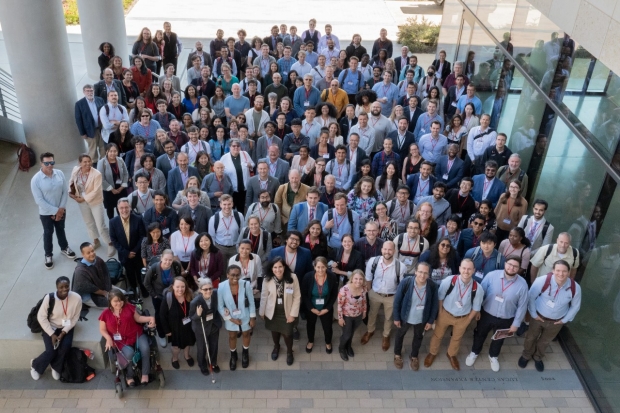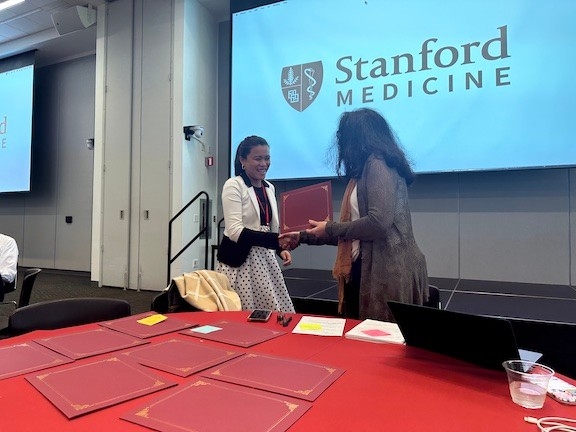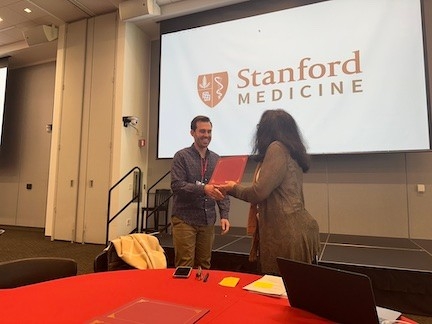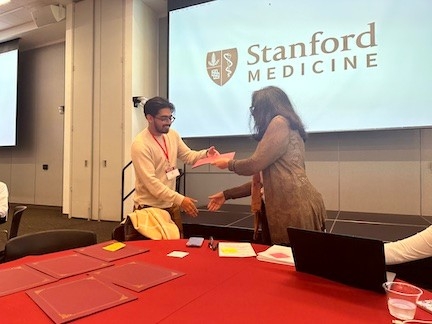Attendees of the 2023 NLM T15 Training Conference
Hosted by Stanford University’s Department of Biomedical Data Science
The 2023 National Library of Medicine’s T-15 Training Conference was hosted by Stanford University’s Department of Biomedical Data Science (DBDS) on June 21-23, 2023. All T-15 institutions from across the country participated and gathered in Stanford, California for the three-day event, which featured a keynote address from Dr. Patti Brennan (left), the director of the NLM and welcome remarks from Dr. Sylvia Plevritis, DBDS chair.
The National Library of Medicine supports research training in biomedical informatics and data science at eighteen educational institutions in the United States. NLM’s T15 program offers graduate education and postdoctoral training and research experiences in a wide range of areas including health care informatics, translational bioinformatics, clinical informatics, public health informatics, and consumer health informatics, according to the NLM T15 website.
The conference began with a Student Professional Engagement Session in which panelists discussed their career paths and answered questions from the audience about strategies and options for securing a first job in academia, research or industry. The panelists who participated were:
°Jessie Tenenbaum, Chief Data Officer, NC Dept. of Health and Human Services; Associate Professor, Duke University School of Medicine
°Abigail Lind, Postdoctoral Fellow, Gladstone Institutes
°Patrick Wu, Senior Scientist, Genentech
°Zackary Falls, Assistant Professor, University at Buffalo
°Guhan Venkatraman, Machine Learning Researcher at Seer, Inc.
Plenary sessions one and two, focus and rapid/tech round talks filled the second day of the conference, along with poster sessions one and two in the afternoon, followed by dinner on the Cantor Arts Museum Lawn next to the Rodin Sculpture Garden.
Plenary talks and focus sessions continued on the last day, culminating in an awards ceremony for the gold, silver and bronze honorees in the the poster, rapid/tech talk, focus talk and plenary talk categories.
Gold: Emma McCord (Indiana – Reigenstrief); Examining primary care provider experiences with using a clinical decision support tool for pain management
Silver: Jonathan Lam (UCSD); Image-Based Screening of Kawasaki Disease
Bronze: Hailey Bussan (University of Wisconsin); MAIT Cells Influence Microbiome and Immune Cells to Alter Atherosclerosis Progression
Gold: Oliver Li (University of Washington); Quantifying Controversy to Characterize Resistance to COVID-19 Misinformation in Social Networks
Silver: Nathaniel R. Greenbaum (Harvard University); Largescale Deidentification of Transthoracic Echocardiograms
Bronze (tie): Michael Rabenberg (State University of New York at Buffalo); Solving the Terminology-Binding Problem through Referent Tracking
Betina Idnay (Columbia); Linked Big Data Uncovers Key Clinical Trial Features Influencing Recruitment
Gold: Saniya Khullar (University of Wisconsin-Madison); Human Gene Regulatory Network for Schwann Cell Development and Maintenance
Silver: Rohini J. Patel (University of California San Diego); An Artificial Intelligence Model for Stroke and Death Prediction using Carotid Plaque Morphology
Bronze: Joy Roy (University of Pittsburgh); Functional network organization is globally atypical in congenital heart defect
Gold: Erin Craig (Stanford); Using the LASSO to identify disease-specific B cell receptors
Silver: Robert J Gallo (Stanford / Veterans Administration); Regression Discontinuity Analysis of a Clinical Deterioration Model Implementation
Bronze: Thomas Brown (Vanderbilt University); Data-based constraints to achieving justice in de-identified data
Afterwards, attendees enjoyed themselves by spending the afternoon at the Santa Cruz Beach Boardwalk before heading back to their home universities.
- Columbia University
- Harvard University
- Indiana University
- Johns Hopkins University
- Medical University of South Carolina
- Oregon Health Sciences University
- Rice University
- Stanford University
- State University of New York at Buffalo
- University of California Los Angeles
- University of California San Diego
- University of Colorado
- University of Pittsburg
- University of Utah
- University of Washington
- University of Wisconsin
- Vanderbilt University
- Yale University
National Library of Medicine (NLM) & the T15 Training Conference
NLM supports research training in biomedical informatics and data science at eighteen educational institutions in the United States. More information about the NLM and its university-based Biomedical Informatics and Data Science Research Training Programs can be found at the following link: NLM T15 page
The Department of Biomedical Data Science (DBDS)
Stanford University School of Medicine’s Department of Biomedical Data Science (DBDS) is host to the NLM T15 Training Conference 2023. DBDS is an academic research community comprised of faculty, students, and staff, whose mission is to advance precision health by leveraging large, complex, multi-scale real-world data through the development and implementation of novel analytical tools and methods. As the home of the Biomedical Informatics Graduate Program, we are proud to foster the development of future leaders through collaboration with our T15 partners.
The School of Medicine at Stanford University
The School of Medicine at Stanford University is research-intensive medical school that promotes diversity and empowers future leaders with the skills they need to be adaptable and resourceful.
A leader in the biomedical revolution, Stanford Medicine has a long tradition of leadership in pioneering research, creative teaching protocols and effective clinical therapies.
Our close proximity to the resources of the university — including the Schools of Business, Law, Humanities and Sciences, and Engineering, our seamless relationship with our affiliated adult and children’s hospitals, and our ongoing associations with the entrepreneurial endeavors of Silicon Valley, make us uniquely positioned to accelerate the pace at which new knowledge is translated into tangible health benefits.
Stanford University
Stanford University has always been a wellspring of new ideas and innovative solutions, where curious people come to make a difference. But the scale and urgency of challenges facing us today require that Stanford amplify what has made us successful in the past and define new ways of making a difference. We are expanding avenues of discovery across all fields while creating new pathways for applying knowledge where it is needed in the world. At the same time we are ensuring that new ideas are grounded in ethics and solutions benefit from diverse perspectives.
Our vision guides Stanford’s approach to research, education and impact and includes new initiatives that accelerate the creation and application of knowledge, anchor research and education in ethics and civic responsibility and promote access and inclusion across our activities. And it recognizes the need to forge deeper partnerships in our community and in the world to move ideas into action.
Stanford’s vision includes four themes inspired by the ideas of our community. Woven throughout those themes is a commitment to ensuring equity and inclusion in our research and on our campus, embedding ethics across research and education and engaging with partners beyond our walls to learn from and give back to our local and global community.





